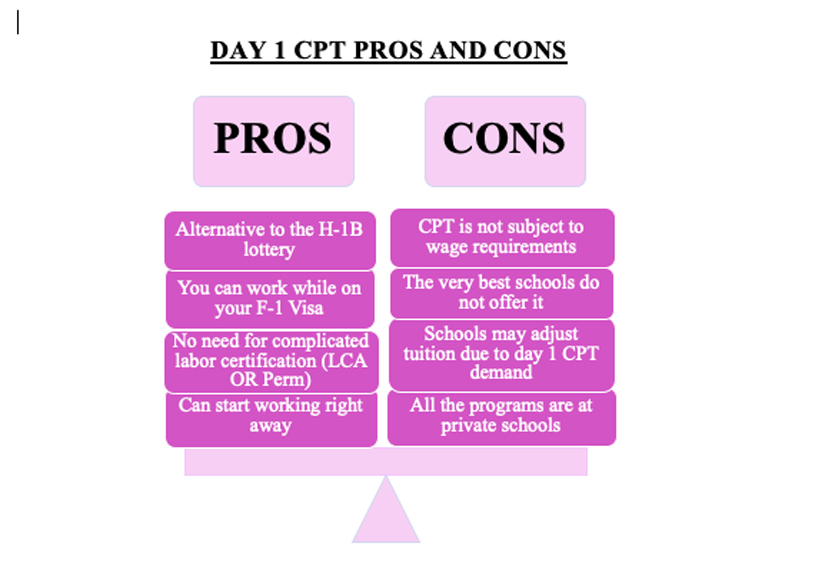Day 1 CPT, is it for me?
 As an international student pursuing your studies in the US on an F-1 visa, Curricular Practical Training (CPT) can be a fantastic way to get immediate work experience in your field and even earn a paycheck. CPT is a job training program run through your international student’s office that allows students to participate in off-campus employment, internships, or other types of practical training related to their academic program that can either be full-time or part-time. The main point of pursuing this program is for students to gain practical experience and enhance their academic and professional skills.
As an international student pursuing your studies in the US on an F-1 visa, Curricular Practical Training (CPT) can be a fantastic way to get immediate work experience in your field and even earn a paycheck. CPT is a job training program run through your international student’s office that allows students to participate in off-campus employment, internships, or other types of practical training related to their academic program that can either be full-time or part-time. The main point of pursuing this program is for students to gain practical experience and enhance their academic and professional skills.
What is Day 1 CPT? As the name suggests, Day 1 CPT is a Master’s or Doctoral degree program that allows students to participate in Curricular Practical Training (CPT) from “Day One” of their course. In all other programs, CPT eligibility can commence 90 days before the end of your first year of study. Day 1 CPT is a good option if you are seeking to work in the US right away as you pursue your studies. While Day 1 CPT is an excellent opportunity for students to obtain real-world experience, you should consider several important factors before deciding to go down this path.
Let’s start with why students are enticed to apply to such programs in the first place. An evident advantage to this is that this form of work authorization gives F-1 visa holders a great opportunity to gain immediate hands-on experience in their field of study, and perhaps develop valuable relationships with potential employers. The key factor to a Day 1 CPT program is that it allows students to work as they complete their studies, as opposed to waiting much closer to graduation in order to gain practical work experience. Take note that if you are only in a 1-year program (such as a 1-year Masters), if it does not allow for Day 1 CPT, you can’t work at all during your brief program except for the last 90 days. This is why most Masters students prefer to use their full year of post completion OPT (Optional Practical Training) after graduation instead of CPT during school.
However, despite being a good opportunity for students, there are downsides to the Day 1 CPT that are important to keep in mind if you are considering this option. Schools that offer Day 1 CPT are private and may charge very high tuition rates (especially for international students). While I am not an academic advisor or career counselor, I occasionally give out career advice to my clients in addition to legal advice. Are these programs the best career or educational choice? Opinions vary. It is hard to say as choosing a school or immigration program is very case specific, and you should consult different sources for advice.
Remember that CPT (Day 1 or regular) must be in your field of study. If you are in a Masters of Business Administration program (MBA), you may have a hard time getting CPT approval to work for an engineering firm. Another potential positive point and negative drawback of Day 1 CPT is that your authorized employment is not subject to any prevailing wage requirement as with an H-1B visa or PERM. Essentially you can work for any agreed upon wage without requiring your employer to match what is common in your geographic region for your job classification.
 Should I consider a program that offers Day 1 CPT? Ask yourself … “Do you want the degree or do you want the CPT?” Sometimes you can get the best of both worlds. However, some clients may consider applying to such a program just to get the CPT. Don’t forget that unpaid internships (even part-time ones) are considered CPT, and you need to contact your DSO or international students’ office and register your internship program. Most international students are unaware of this!
Should I consider a program that offers Day 1 CPT? Ask yourself … “Do you want the degree or do you want the CPT?” Sometimes you can get the best of both worlds. However, some clients may consider applying to such a program just to get the CPT. Don’t forget that unpaid internships (even part-time ones) are considered CPT, and you need to contact your DSO or international students’ office and register your internship program. Most international students are unaware of this!
Day 1 CPT may also restrict students’ access to other programs like OPT. This is because students who have already used up their Day 1 CPT may not be eligible for other types of work authorization, as these programs have more stringent standards for work authorization. This implies that students who take part in Day 1 CPT might exhaust their allotted time for practical training, which might limit their future eligibility for various forms of work authorization. For instance, students whose Day 1 CPT has already been used up, would not be eligible for OPT or might only be eligible for a shorter period of time.
Additionally, students should be informed that Day 1 CPT might not be offered to all of them or for all programs, as there may be limitations or restrictions on who is eligible to participate. For example, certain colleges might only provide Day 1 CPT for specific programs or majors, such as STEM fields, while others might not. Universities may also have particular standards or prerequisites that students must satisfy in order to be eligible for Day 1 CPT, such as a minimum GPA or the completion of a particular curriculum.
To conclude, Day 1 CPT may provide international students with a fantastic opportunity to obtain job experience, but it is crucial to thoroughly investigate and weigh your alternatives before choosing, as certain colleges may have strict guidelines or restrictions on which programs qualify for Day 1 CPT. Carefully weigh the system’s possible downsides and problems before choosing whether to pursue Day 1 CPT or other forms of work authorization. I advise you to seek an immigration lawyer who can help you carefully investigate and guide you as you weigh your choices.
 *This article does not constitute a solicitation or provision of legal advice and does not establish an attorney-client relationship. The answers provided should not be used as a substitute for obtaining legal advice from an attorney licensed or authorized to practice in your jurisdiction. You should always consult a suitably qualified attorney regarding any specific legal problem or matter in a timely manner.
*This article does not constitute a solicitation or provision of legal advice and does not establish an attorney-client relationship. The answers provided should not be used as a substitute for obtaining legal advice from an attorney licensed or authorized to practice in your jurisdiction. You should always consult a suitably qualified attorney regarding any specific legal problem or matter in a timely manner.
Attorney Seth Finberg is a 2005 graduate of the University of Georgia School of Law and is a member of the Georgia Bar and the American Immigration Lawyers Association (AILA). He is the owner and founder of Finberg Firm PLLC (located in Ft. Lauderdale, FL) and he represents clients nationwide and internationally in the areas of business, employment, and family-based immigration. Mr. Finberg is an active member of the Miami Asylum Office Committee for AILA South and Central Florida and he serves as a legal captain in pro bono clinics for Temporary Protected Status. Seth has been recognized for his outstanding pro bono service by the South Florida chapter of the American Immigration Lawyers Association, winning their 2021 Pro Bono Champion award. He can be reached by phone at (954)-843-3568 / (954) 249-6603 or by email at seth@finbergfirm.com or at www.finbergfirm.com.
























